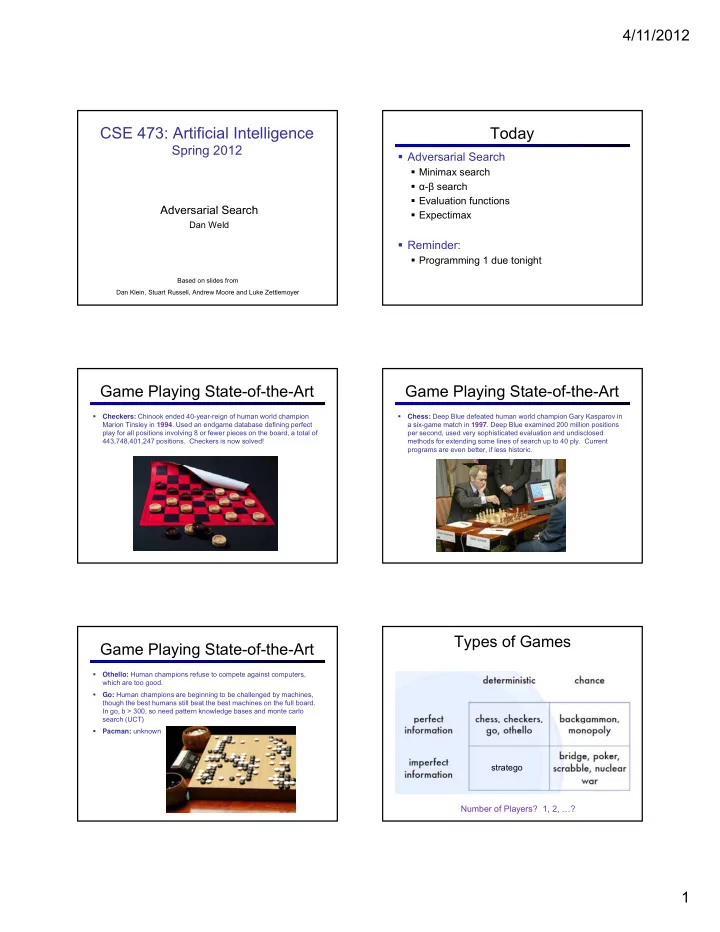

4/11/2012 CSE 473: Artificial Intelligence Today Spring 2012 Adversarial Search Minimax search α - β search Evaluation functions Adversarial Search Ad i l S h Expectimax Dan Weld Reminder: Programming 1 due tonight Based on slides from Dan Klein, Stuart Russell, Andrew Moore and Luke Zettlemoyer 1 Game Playing State-of-the-Art Game Playing State-of-the-Art Checkers: Chinook ended 40-year-reign of human world champion Chess: Deep Blue defeated human world champion Gary Kasparov in Marion Tinsley in 1994 . Used an endgame database defining perfect a six-game match in 1997 . Deep Blue examined 200 million positions play for all positions involving 8 or fewer pieces on the board, a total of per second, used very sophisticated evaluation and undisclosed 443,748,401,247 positions. Checkers is now solved! methods for extending some lines of search up to 40 ply. Current programs are even better, if less historic. Types of Games Game Playing State-of-the-Art Othello: Human champions refuse to compete against computers, which are too good. Go: Human champions are beginning to be challenged by machines, though the best humans still beat the best machines on the full board. In go, b > 300, so need pattern knowledge bases and monte carlo search (UCT) Pacman: unknown stratego Number of Players? 1, 2, …? 1
4/11/2012 Deterministic Games Deterministic Single-Player Deterministic, single player, Many possible formalizations, one is: perfect information: States: S (start at s 0 ) Know the rules, action effects, winning states Players: P={1...N} (usually take turns) E.g. Freecell, 8-Puzzle, Rubik ʼ s cube Actions: A (may depend on player / state) Actions: A (may depend on player / state) … it ʼ s just search! it ʼ j t h! Transition Function: S x A S Slight reinterpretation: Each node stores a value: the Terminal Test: S {t,f} best outcome it can reach This is the maximal outcome of Terminal Utilities: S x P R its children (the max value) Note that we don ʼ t have path sums as before (utilities at end) Solution for a player is a policy : S A After search, can pick move that leads to best node lose win lose Deterministic Two-Player Tic-tac-toe Game Tree E.g. tic-tac-toe, chess, checkers Zero-sum games max One player maximizes result The other minimizes result min min Minimax search A state-space search tree Players alternate 8 2 5 6 Choose move to position with highest minimax value = best achievable utility against best play Minimax Example Minimax Example max max min min 3 2
4/11/2012 Minimax Example Minimax Example max max min min 3 2 3 2 2 Minimax Example Minimax Search max 3 min 2 2 3 Minimax Properties Optimal? Yes, against perfect player. Otherwise? max Time complexity? O(b m ) min min Space complexity? O(bm) 10 10 9 100 For chess, b 35, m 100 Exact solution is completely infeasible But, do we need to explore the whole tree? 3
Recommend
More recommend